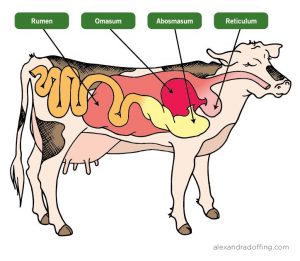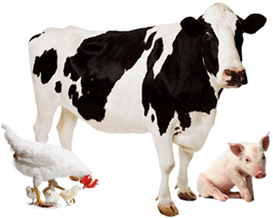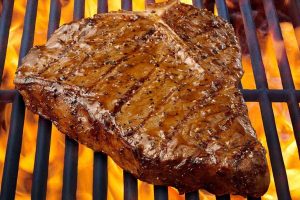 A friend sent me this quote from a low carb blog. “Beef is very low in omega 6, however chicken and pork are somewhat higher. This is due to the fact that cows are herbivores, while pigs and chickens are omnivores. They have very different digestive systems. When beef is raised on grains (high in omega 6), very little of it gets transferred into the fatty tissue of the animal. But when pork or poultry is raised on grains, quite a bit of the omega 6 present in the grains gets transferred into the fatty tissue of the animal. I believe this may be why many people find pork and chicken to be far more inflammatory than beef.” I have written about how Omega-3 fatty acids decrease inflammation and protect the heart and how Omega-6 fatty acids increase inflammation here.
A friend sent me this quote from a low carb blog. “Beef is very low in omega 6, however chicken and pork are somewhat higher. This is due to the fact that cows are herbivores, while pigs and chickens are omnivores. They have very different digestive systems. When beef is raised on grains (high in omega 6), very little of it gets transferred into the fatty tissue of the animal. But when pork or poultry is raised on grains, quite a bit of the omega 6 present in the grains gets transferred into the fatty tissue of the animal. I believe this may be why many people find pork and chicken to be far more inflammatory than beef.” I have written about how Omega-3 fatty acids decrease inflammation and protect the heart and how Omega-6 fatty acids increase inflammation here.

cow stomach diagram 646
In a cow which has 4 stomachs the grains and plant materials which are so high in Omega-6 fatty acids sit in stomach after stomach where many of the omega-6 fatty acids are metabolized by the bacteria to very short chain fatty acids which the cow then absorbs and combines to produce healthy Saturated and omega-3 fatty acids and the majority of the omega-6’s are metabolized by the bacteria in all those stomachs as this study shows. Of course grain fed cattle do have slightly higher levels of Omega-6 and lower levels of Omega-3. Here’s a study about that.
So I decided to do some nutritional research to check out this theory. Here’s what I found on Nutritiondata.com that uses USDA data. It clear from these data that, pork and chicken are much more proinflammatory than beef.
 100 g roast chicken has 70 mg Omega-3 fatty acids and 590 mg Omega-6
100 g roast chicken has 70 mg Omega-3 fatty acids and 590 mg Omega-6
100 g pork roast has 76 g Omega-3 fatty acids and 2286 mg of Omega-6
100 g beef chuck roast has 270 mg Omega-3 fatty acids and 670 mg Omega-6
 Many of my international friends have pointed out that I forgot to mention the other highly nutritious herbivore – Sheep. Sheep meat is not nearly as available here in the United States as it is in many countries around the world. Here are the statistics for lamb:
Many of my international friends have pointed out that I forgot to mention the other highly nutritious herbivore – Sheep. Sheep meat is not nearly as available here in the United States as it is in many countries around the world. Here are the statistics for lamb:
100 g roast lamb Total Omega-3 fatty acids 370 mg Total Omega-6 fatty acids 1240 mg
That’s just as good or better than beef. Wish I could find some affordable lamb around here.
I’m a huge fan of beef. I still eat pork and chicken because it is a 1000 time more nutritious than any plant based food but I do tend to eat mostly beef.
Paul, thanks for including the NCBI data reports which supports the value of eating beef.
I suspect Chick-fil-A is not posting your blog in their restaurants!
Your blog posts about zonulins are very interesting – this was new to me.
I would love to see your take on lectins as well.
I am already working on a post called Plant Anti-Nutrients of which Lectins are some of the worst offenders.
You need to make sure that, when comparing the different meats, you compare meats with the same percentage of fat per amount of meat. When I did that, pork was about 4-6 times higher in omega 6 than beef, and chicken was 8-12 times high I omega 6 than beef.
All of these number were based on meats that were 50% fat by calories.
100 gm Chicken = 2.7 gm Omega 6
100 gm Pork = 1.2 gm Omega 6
100 gm Beef = 0.27 mg! Omega 6
The main point of the post is that DHA is a very important nutrient that helps our brains, protects our hearts and decreases inflammation. Omega-6 is also something we have to eat that we can’t make ourselves but it is much easier to find in nature than Omega-3, That’s why I consider Omega-3 fatty acids the rare jewel or precious gold of nutrition. Either fatty acid can have adverse effects in excess and people who eat plant foods especially seed oils stand at great risk of getting excessive Omega-6 fatty acids. People who don’t eat animal fats are at risk of not getting enough Omega-3 fatty acids. Pretty much no one, except maybe a “Dean Ornish” level, avoid all fats eater is in danger of not getting enough Omega-6. That’s why I prefer Beef and/or Lamb or fish (lamb and fish are not an easily obtained option for me) while Chicken, Pork and other omnivorous mammals I find less desirable because of the lower Omega-3 levels, though I certainly eat them occasionally. I also eat a lot of cheese and butter because these are also relatively high in Omega-3 fatty acids.
Beefeaters must be former senior non-commissioned officers, or petty officers, with a minimum of 22 years’ service in the Army, RAF or Royal Marines.
I certainly don’t qualify to be a Beefeater. I certainly respect them. I had a military career with 26 years of service and 4 combat deployments retiring with the rank of Full Colonel.
Elimbio, I guess you missed the play on words! Lighten up because the blog made some great points on Omega 6/3 I had not considered in comparing the meats as did the response from Esmee.
Answer A Beefeater is the popular name for the for the Yeomen Warders of Her Majesty s Royal Palace and Fortress the Tower of London.